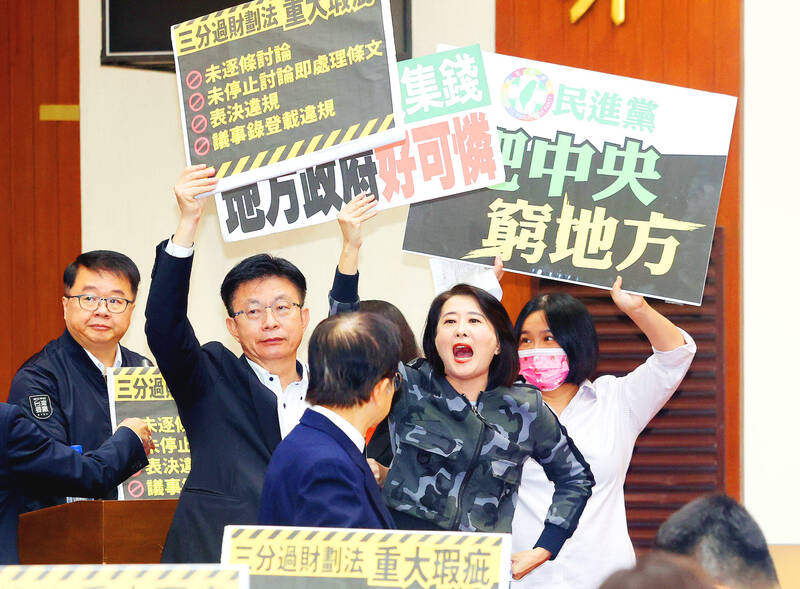Lawmakers noisily disagreed over procedural issues in the Legislature yesterday in relation to an act regulating the allocation of funding between central and local governments, leading to deadlock at the Finance Committee.
Opposition lawmakers shouted and held up placards with the slogan "fat central government, poor local governments" while legislators from the ruling party shouted back and held up signs suggesting there were "major flaws" in legislative procedure over the committee’s earlier handling of the funding bill.
The main opposition Chinese Nationalist Party (KMT), together with the smaller Taiwan People’s Party (TPT), has a majority in the Legislature, and they are seeking to pass 22 amendments to the Act Governing the Allocation of Government Revenues and Expenditures (財政收支劃分法) opposed by the ruling Democratic Progressive Party (DPP).

Photo: CNA
The proposed amendments are aimed at raising the proportion of government revenues that go to local governments at the expense of the central government. Under the current legislation, the central government is allocated 75 percent while local governments are given 25 percent of available funding.
The amendments, if passed into law, would also prevent the central government from reducing the amount of subsidies -- not included in the 75-25 ratio split currently regulated by the act -- that it currently grants to local authorities.
On Nov. 6, KMT Legislator Chen Yu-jen (陳玉珍), then-convener of the Legislature’s Finance Committee, declared the proposed amendments had cleared the committee review stage and adjourned the meeting just three minutes after it started.
However, at the Finance Committee meeting held yesterday under rotating convener of DPP Legislator Lai Hui-yuan (賴惠員), the opposing camps locked horns over how the draft amendments were handled last week.
"Last week’s bill review procedure seriously violated official regulations," DPP Legislator Wu Ping-jui (吳秉叡) told the meeting, referring to the Act Governing the Legislative Yuan’s Power (立法院職權行使法) and the Rules of Procedure of the Legislative Yuan (立法院議事規則). "So we believe the completion [of the draft amendments through the committee stage] should be considered to be invalid."
Wu argued the meeting’s minutes were "not recorded according to the regulations," suggesting that the minutes not be confirmed.
"The DPP also made adjustments to the KMT’s version of the draft amendments," said Chen.
"It was already discussed. If you don’t know that then don’t talk nonsense," she added.
DPP caucus whip Rosalia Wu (吳思瑤) said the disagreement over whether the draft amendments had cleared committee review stage according to regulations was a "major controversy" and called for Legislative Speaker Han Kuo-yu (韓國瑜) to address the issue through cross- party negotiations.
KMT lawmakers called for the issue to be put to a vote, while the DPP requested that officials from the Directorate- General of Budget, Accounting, and Statistics (DGBAS) submit an oral report as scheduled.
As the stand-off continued, some lawmakers pushed and shoved each other in an attempt to seize control of microphones to shout down opposing members of the meeting.
Lai eventually walked off and did not return, causing the remaining lawmakers to disperse at around 5.30 pm.
Without a consensus at the committee concerning the legitimacy of the last meeting’s outcome, the partisan impasse is set to continue over the coming days.

The manufacture of the remaining 28 M1A2T Abrams tanks Taiwan purchased from the US has recently been completed, and they are expected to be delivered within the next one to two months, a source said yesterday. The Ministry of National Defense is arranging cargo ships to transport the tanks to Taiwan as soon as possible, said the source, who is familiar with the matter. The estimated arrival time ranges from late this month to early next month, the source said. The 28 Abrams tanks make up the third and final batch of a total of 108 tanks, valued at about NT$40.5 billion

Two Taiwanese prosecutors were questioned by Chinese security personnel at their hotel during a trip to China’s Henan Province this month, the Mainland Affairs Council (MAC) said yesterday. The officers had personal information on the prosecutors, including “when they were assigned to their posts, their work locations and job titles,” MAC Deputy Minister and spokesman Liang Wen-chieh (梁文傑) said. On top of asking about their agencies and positions, the officers also questioned the prosecutors about the Cross-Strait Joint Crime-Fighting and Judicial Mutual Assistance Agreement, a pact that serves as the framework for Taiwan-China cooperation on combating crime and providing judicial assistance, Liang

A group from the Taiwanese Designers in Australia association yesterday represented Taiwan at the Midsumma Pride March in Melbourne. The march, held in the St. Kilda suburb, is the city’s largest LGBTQIA+ parade and the flagship event of the annual Midsumma Festival. It attracted more than 45,000 spectators who supported the 400 groups and 10,000 marchers that participated this year, the association said. Taiwanese Designers said they organized a team to march for Taiwan this year, joining politicians, government agencies, professionals and community organizations in showing support for LGBTQIA+ people and diverse communities. As the first country in Asia to legalize same-sex

MOTIVES QUESTIONED The PLA considers Xi’s policies toward Taiwan to be driven by personal considerations rather than military assessment, the Epoch Times reports Chinese President Xi Jinping’s (習近平) latest purge of the Chinese People’s Liberation Army (PLA) leadership might have been prompted by the military’s opposition to plans of invading Taiwan, the Epoch Times said. The Chinese military opposes waging war against Taiwan by a large consensus, putting it at odds with Xi’s vision, the Falun Gong-affiliated daily said in a report on Thursday, citing anonymous sources with insight into the PLA’s inner workings. The opposition is not the opinion of a few generals, but a widely shared view among the PLA cadre, the Epoch Times cited them as saying. “Chinese forces know full well that